|
|
|
Sort Order |
|
|
|
Items / Page
|
|
|
|
|
|
|
| Srl | Item |
| 1 |
ID:
143474


|
|
|
|
|
| Publication |
Massachusetts, Center for International Studies, 1980.
|
| Description |
67p.pbk
|
|
|
|
|
|
|
|
|
|
|
|
Copies: C:1/I:0,R:0,Q:0
Circulation
| Accession# | Call# | Current Location | Status | Policy | Location |
| 023133 | 330.95195/GRI 023133 | Main | On Shelf | General | |
|
|
|
|
| 2 |
ID:
157785
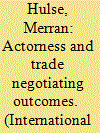

|
|
|
|
|
| Summary/Abstract |
In 2014, the EU concluded Economic Partnership Agreements (EPAs) with several African, Caribbean and Pacific (ACP) regions. These EPAs represent some of the most advanced examples of interregional cooperation. Yet, the outcomes of EPA negotiations are not the same across all regions. This article investigates differences in negotiated outcomes and argues that regional actorness – the ability of regions to become identifiable, to aggregate the interests of member states, to formulate collective goals and to make and implement decisions – influences regions’ ability to navigate interregional trade negotiations. In a comparison of the actorness and negotiated outcomes of West Africa and the SADC EPA Group, the article shows that actorness matters for international negotiations: regions with higher levels of actorness can negotiate better outcomes even under conditions of stark power asymmetry.
|
|
|
|
|
|
|
|
|
|
|
|
|
|
|
|
| 3 |
ID:
140192
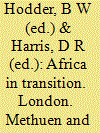

|
|
|
|
|
| Publication |
London, Methuen and co. ltd., 1967.
|
| Description |
x, 378p.:figureshbk
|
|
|
|
|
|
|
|
|
|
|
|
Copies: C:1/I:0,R:0,Q:0
Circulation
| Accession# | Call# | Current Location | Status | Policy | Location |
| 000535 | 916.04960/HOD 000535 | Main | On Shelf | General | |
|
|
|
|
| 4 |
ID:
015825


|
|
|
|
|
| Publication |
Feb 1993.
|
| Description |
67-76
|
|
|
|
|
|
|
|
|
|
|
|
|
|
|
|
| 5 |
ID:
062051
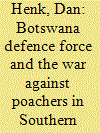

|
|
|
| 6 |
ID:
027851


|
|
|
|
|
| Publication |
Cambridge, Cambridge University Press, 1984.
|
| Description |
xvi, 1011p.hbk
|
| Contents |
Vol. VIII: From c. 1940 to c. 1975
|
| Standard Number |
0521224098
|
|
|
|
|
|
|
|
|
|
|
|
Copies: C:1/I:0,R:0,Q:0
Circulation
| Accession# | Call# | Current Location | Status | Policy | Location |
| 028008 | 960/CRO 028008 | Main | On Shelf | General | |
|
|
|
|
| 7 |
ID:
159447
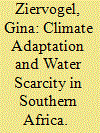

|
|
|
|
|
| Summary/Abstract |
“Adaptation is only going to get more challenging as changes in the climate intensify, combining with the effects of rapid urbanization and the persistently high levels of poverty and inequality in Africa.” Eighth in a series on climate adaptation around the world.
|
|
|
|
|
|
|
|
|
|
|
|
|
|
|
|
| 8 |
ID:
090770
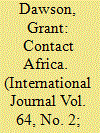

|
|
|
|
|
| Publication |
2009.
|
| Summary/Abstract |
Participation in the contact group serviced Canada's foreign policy interests in Africa. Ministers and bureaucrats believed that Canada's developing relations with black Africa were becoming more important than the traditional link to South Africa. The government hoped to maintain Canada's positive reputation among Africans by working on problems of cocern to positive reputation among Africans by working on problems of concern to them, such as South Africa's control of Namibia and apartheid.
|
|
|
|
|
|
|
|
|
|
|
|
|
|
|
|
| 9 |
ID:
060414
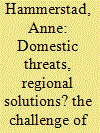

|
|
|
| 10 |
ID:
074929
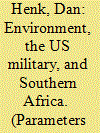

|
|
|
|
|
| Publication |
2006.
|
| Summary/Abstract |
Since the 1960s, the environment has become a consistent theme in international political discourse, no longer solely the concern of small groups of activists but a mainstream issue. As environmental concerns have gone increasingly global, countries like Norway and Finland have garnered international acclaim for their strong commitment to environmental causes. The government of the United States, in contrast, has been widely and vehemently criticized for its alleged disinterest. The bad press is ironic because the United States is engaged with other countries on a wide range of environmental issues. A significant amount of that involvement occurs in regions of the world where America's policymakers are hard pressed to find any vital interest. Perhaps more surprisingly, the US Department of Defense is an actor in these activities, a situation doubly ironic because America's military leaders have never engaged in serious, protracted debate to define environmentally-related military roles and responsibilities.
|
|
|
|
|
|
|
|
|
|
|
|
|
|
|
|
| 11 |
ID:
129468
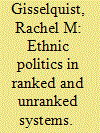

|
|
|
|
|
| Publication |
2013.
|
| Summary/Abstract |
This article explores how ethnic politics may operate differently in societies with "ranked" versus "unranked" ethnic systems, where ethnicity and class correlate closely versus very little. It focuses on two hypotheses suggested, but not tested, in Donald Horowitz's Ethnic Groups in Conflict. Their plausibility is explored in seven brief case studies of electoral politics in South America and Southern Africa. The analysis suggests that theories of ethnic politics that fail to take class into account are problematic for the study of ranked societies in particular.
|
|
|
|
|
|
|
|
|
|
|
|
|
|
|
|
| 12 |
ID:
116889
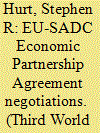

|
|
|
|
|
| Publication |
2012.
|
| Summary/Abstract |
This article focuses on the negotiation of Economic Partnership Agreements (epas) which form the central focus of the commitments made in the Cotonou Agreement, signed in 2000 by the European Union and the African, Caribbean and Pacific (acp) states. epas are part of a much wider trend witnessed since the creation of the World Trade Organization (wto), characterised by the proliferation of bilateral free trade agreements. The article argues that both the material and ideational interests of the EU need to be considered alongside the historical context of EU-acp relations. The EU is making a concerted effort to 'lock in' neoliberalism across the seven different sub-regions of the acp group by negotiating epas that include both reciprocal trade liberalisation and various 'trade-related' issues. In this way epas will go beyond the requirements for wto compatibility, resulting in a reduction of the policy space for acp states to pursue alternative development strategies. The article then considers the potential developmental impact of epas with reference to the negotiations with seven of the 15 member states of the Southern African Development Community (sadc). It is argued that the EU is promoting 'open regionalism', which poses a threat to the coherence of the regional project in southern Africa.
|
|
|
|
|
|
|
|
|
|
|
|
|
|
|
|
| 13 |
ID:
138687
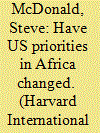

|
|
|
|
|
| Summary/Abstract |
At the end of the first ever US-Africa Leaders Summit on August 7, 2014, President Obama declared that it had been an “extraordinary event,” citing the accomplishments of the summit in terms of trade, investment, and security cooperation. Included in the latter category was a commitment to peacekeeping and the need to address corruption and bad governance in the continent.
|
|
|
|
|
|
|
|
|
|
|
|
|
|
|
|
| 14 |
ID:
165197
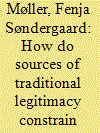

|
|
|
|
|
| Summary/Abstract |
Research concerning authoritarian stability and peace usually investigates co-optation and repression. Recently, several studies argue that traditional legitimacy is also important for stability in monarchies. However, existing research rarely considers how legitimacy constrains rebellions and help the royal family to stay in power. Hence, this article explores the causal links between sources of traditional legitimacy and absence of uprisings. The study investigates the relationship with a case study of the Kingdom of Swaziland. In line with my expectations, I find a causal relationship between sources of traditional legitimacy and absence of popular uprisings. First, the royal family actively uses traditional legitimacy to justify their rule. Second, the Afrobarometer indicates that the Swazi people trust the King more than citizens in other African countries trust their head of state. Third, opposition actors have limited opportunities to mobilize the broader population against the monarchy. Fourth, traditional legitimacy dampens ongoing protests and thereby hinders their escalation into popular uprisings or political violence. Repression is clearly an important explanation for limited rebellion in Swaziland, but this article shows that also traditional legitimacy sources play a role
|
|
|
|
|
|
|
|
|
|
|
|
|
|
|
|
| 15 |
ID:
142189
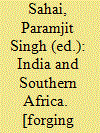

|
|
|
|
|
| Publication |
New Delhi, Pentagon Press, 2015.
|
| Description |
xxxiii, 294p.hbk
|
| Standard Number |
9788182748552
|
|
|
|
|
|
|
|
|
|
|
|
Copies: C:1/I:0,R:0,Q:0
Circulation
| Accession# | Call# | Current Location | Status | Policy | Location |
| 058400 | 327.54068/SAH 058400 | Main | On Shelf | General | |
|
|
|
|
| 16 |
ID:
140783
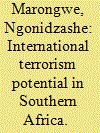

|
|
|
|
|
| Summary/Abstract |
This article discusses the potential factors for the development of international terrorism in southern Africa. While the region has seemingly been spared the terror attacks that have ravaged most other parts of the continent, and the globe at large, it is not immune to these attacks. Using a survey of the Southern African Development Community (SADC) countries, particularly the Democratic Republic of the Congo, Mozambique, South Africa, Mauritius, Zimbabwe, and Tanzania, which illuminate some of the permissive factors, the article asks, largely, first, to what extent is southern Africa at risk of global terrorism? And, second, in what ways can southern African states reduce the risk of terrorism in the region? Broadly, the article contends that, like most developing countries, including those from other parts of Africa, there exist permissive, both root and trigger, factors including insecure borders, democratization challenges, poverty, urban centers and variegated forms of both sub-state and state terrorism, that could provide useful platforms for the growth of international terrorism.
|
|
|
|
|
|
|
|
|
|
|
|
|
|
|
|
| 17 |
ID:
012112
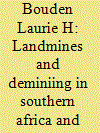

|
|
|
|
|
| Publication |
May 1997.
|
| Description |
263-270
|
|
|
|
|
|
|
|
|
|
|
|
|
|
|
|
| 18 |
ID:
119252
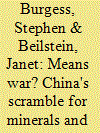

|
|
|
|
|
| Publication |
2013.
|
| Summary/Abstract |
The tendency for rising powers to seek control of resource markets is being repeated in Southern Africa, where rising powers led by China are competing for strategic minerals. This could lead to market failure, shutting out Western companies. However, competition does not mean that armed conflict will occur. The global reach of the United States is such that it can take measures short of war to guarantee the flow of minerals. China will be at a strategic disadvantage for some time in relation to the United States and cannot assert control over the flow of minerals. The Southern Africa case shows that even in the era of globalization, monopolization and nationalization of resources will still be attempted, but those efforts are likely to be countered by global forces in favour of free markets. Rising powers like China may temporarily monopolize resources found on their own territory, but strong global forces will ensure that the flow of most resources continues. Monopolization is unlikely to work outside the territory of rising powers, because they still must rely on sea lanes to transport those minerals. The United States still has the ultimate trump in its navy, which can stop the flow of resources to any would-be monopolist.
|
|
|
|
|
|
|
|
|
|
|
|
|
|
|
|
| 19 |
ID:
068270
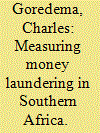

|
|
|
| 20 |
ID:
068273
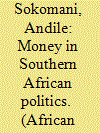

|
|
|
|
|
|
|
|